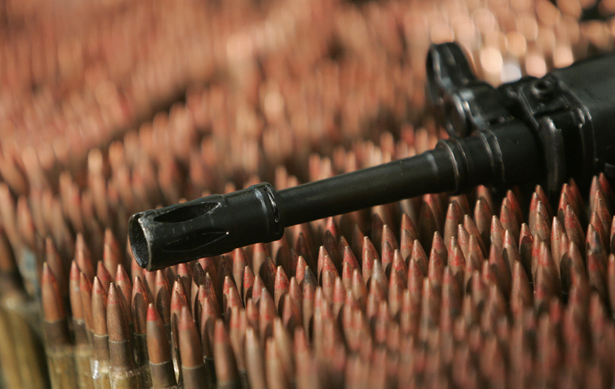
(AP Photo/Ricardo Moraes)
Editor’s Note: Each week we cross-post an excerpt from Katrina vanden Heuvel’s column at the WashingtonPost.com. Read the full text of Katrina’s column here.
Knives. Automobiles. Cold medicine. Alcohol. Cigarettes. Coffee.
What do these items have in common?
They’re all held to a higher safety standard than firearms.
Because of product-liability law, manufacturers must equip them with proper warnings, limitations and built-in designs that enhance their safety.
If they don’t, consumers can sue them for harm caused by the product. And all consumer products manufacturers are required to ensure that their products are free of design defects and don’t threaten public safety.
Guns, as Jonathan Lowy of the Brady Center to Prevent Gun Violence’s Legal Action Project has said, are “the only consumer product in America with no federal safety oversight.”
Firearms haven’t always been a protected class; but as the industry lost millions in lawsuits over the years, liability protection became the NRA’s holy grail.
Before 2005, the Brady Center — named for President Reagan’s press secretary James Brady, who was shot and paralyzed in a failed assassination attempt on the president — had launched multiple lawsuits around the country. Los Angeles, New York and 30 other cities, counties and states had filed civil lawsuits against gun manufacturers — including a $100 million suit against the gun industry by Bridgeport, Connecticut in 1999. The pain inflicted on negligent manufacturers was real and it was expensive. In 2003, Bryco Arms declared bankruptcy after paying $24 million in the case of a 7-year-old boy who was paralyzed by a defective gun.
Before the gun lobby successfully killed all gun control legislation, there were some key wins in the fight to hold gun manufacturers liable. Last year, the New York State appellate court ruled that a Buffalo man who was shot nearly a decade ago could sue the gun manufacturer, distributor and dealer. In January 2013, Rep. Adam Schiff introduced legislation to fight legal immunity for gun manufacturers and dealers, the Access to Justice for Victims of Gun Violence Act.
Editor’s Note: Each week we cross-post an excerpt from Katrina vanden Heuvel’s column at the WashingtonPost.com. Read the full text of Katrina’s column here.


